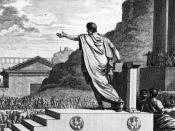Tiberius Gracchus' life can be split into many areas, all of which have been debated and studied over the discourse of many years. The following areas will be discussed. Gracchus' family background, education and early career to 134 BC. The Aims and Significance of Gracchus' Lex Agraria. Gracchus' political supporters and opponents and The motives, context and events of Tiberius Gracchus' assasinationGracchus' family background, education and early career to 134 BCConcerning Gracchus' family background, education and early career, there is not much information. The main sources include Plutarch and Appian which both argue that Tiberius Gracchus had a lot to live up to and there were heavy expectations placed upon his name. It is, however, very important to note that even though Appian and Plutarch seem to contradict each other at some intervals and even totally disagree with each other, they are still our main sources concerning Tiberius Gracchus.
Born into an aristocratic Roman family, Tiberius Sempronius was heir to a nexus of political connections with other leading families. Gracchus' family, the Sempronii, received their first consul in 304 BC. Plutach explains how Gracchus had twice been consul and was privileged enough to have celebrated two triumphs. Plutarch places a lot of emphases on the fact that Tiberius' father held the position of consul twice, even though many were extremely lucky to hold the position once. The fact that many young Roman were encouraged to and aspired to precede their fathers in accomplishments allows us to understand just how much was to be expected of Tiberius Gracchus. Plutarch also places a lot of emphasis on Tiberius' mother Cornelia when considering Tiberius' background. The reason for this is because of the fact that Cornelia's father Scipio Africanus Major was the general who defeated Hannibal in the Second Punic War.
Putarch then goes on to explain that 'his fame was great enough to earn him entry into the so-called priesthood of augurs, an honour he owed to his excellence, rather than to his noble name'. This suggests that many people saw Tiberius as a young man with a lot of potential rather than a young man surviving off his families name and previous accomplishments. A lot of people were beginning to sense that there was much more to come from Tiberius. We can therefore rely on the word of Plutarch because of this.
In accordance with Plutarch, Tiberius' education was to undergo during the Third Punic War against Carthage under the younger Scipio. After the conclusion of the campaign Tiberius was then elected to quaestor during the war against Numantia. It was therefore because of Tiberius' background that he was able to negotiate the lives of many Roman Soldiers under the Numantine Treaty. Although the Numantine Treaty was a failure, Tiberius then used his family background once again to escape punishment.
The Aims and Significance of Gracchus' Lex AgrariaThe Lex Agraria was essentially, as portrayed by Plutarch, a law barring any individual from holding more than 500 Iugera of land. This limit enabled the members of the landless community to hold at least some of the left over ager publicus, which was to be distributed by a commission of three . Plutarch's depiction however, is focussed upon the facts of the law, rather than its aims and significance. On the other hand, Appian's argument focuses upon the aim of the Lex Agraria: "Their aim was to encourage the fertility of the Italian race, a race they reckoned to be the most hardworking of people, to ensure a plentiful supply of domestic allies." Furthermore, Appian states that "His aim was not economic, but human wealth."Opinions differ as to wether the law was aimed at Roman or Italian citizens or both. Richardson argues "that there can be no doubt that Appian thought the distribution of land to the Italians was an integral part of Gracchus' plan." Furthermore, he argues that the reason for the "discrepancy between Appian and Plutarch lies in Gracchus' original intention to include the Italians." Therefore, his conclusion that the Italian citizens were in fact considered part of Gracchus aim must be considered. Lintott, in response to Richardson, provides the Heterodoxy opinion: "there is no clear-cut evidence apart from Gracchus' speeches that the poor Italians were among the beneficiaries." These Speeches that Lintott mentions come from Plutarch, whose validity and accuracy have certainly been questioned. Therefore, in light of Richardson's sound argument, it must be concluded that the Lex Agraria was aimed at both the Italian and Roman citizens.
The significance of the Lex Agraria has been debated in terms of the extent to which it was revolutionary. It can be obtained, through examination of the ancient material, that the measure of the bill's significance is in its opposition. Cicero attests that "the best people threw their weight against it because they believed that to remove the rich from their long-held possessions was to rob the state of its defenders" . Plutarch's argument is very similar , however Appian provides no detail as to the opposition of the bill. Lintott argues that the laws significance is unquestionable: "it was not an emergency measure to deal with a crisis, but one which sought to improve the social and economic conditions of Italy in the long term." Therefore, as is held by historical opinion, the significance or the Lex Agraria was unquestionable. Its opposition from the wealthy factions prove it was seen as a change in conventional Roman politics.
Gracchus' political supporters and opponentsIn order to understand the stance each individual took, one must examine the influence Scipio Aemilianus had upon the decisions one took as to whether they were going to support or oppose Ti. Gracchus' reforms. Briscoe places the contemporaries of Tiberius in the following categories . 1) A former supporter of Scipio who joined Gracchus in his break away. 2) A friend of Scipio who remains loyal. 3) An opponent of Scipio who supported Gracchus.
In order to understand why these groups have been formed, one supporter and one opponent will be examined.
Scaevola and Nasica were both involved heavily in Tiberius' life. One supported Gracchus and was on his original land commission , the other lead the support that eventually killed Gracchus. Both need to be examined within the categories stated above.
Mucius Scaevola is a man who presents a perplexing paradox as to where his support lay. Little evidence is supplied in the ancient material, except that of a mention of his involvement in Tiberius' original land commission, holding similar in Plutarch, Appian and Cicero. Richardson states that Scaevola supported Gracchus, but after he was killed, defended Nasica, his killer. It is hard to see how one who helped Tiberius prepare his measure be considered a political independent. Therefore, although at times paradoxical, Scaevola's stance can be seen as supportive of Tiberius.
In examining the murderer of Tiberius Gracchus, Nasica, there seems no problem; he must be an opposer of Tiberius. However, if he is related back to the initial categories, his relationship with Scipio Aemilianus can be seen as somewhat non-existent. If the ancient texts are examined, the only mention we have of Nasica, is his involvement in the murder, found in Appian and Plutarch. Therefore, after examination of the ancient material, there seems to be no evidence for a political friendship between Nasica and Scipio. Similarly, as Briscoe concludes, " Nasica is then one, and the most important, of the opponents of Scipio who were also opponents of Gracchus."The motives, context and events of Tiberius Gracchus' assasinationThe events of Tiberius Gracchus' assasination have become thoroughly debated and argued. The most contemporary sources available, Cicero, Appian and Plutarch provide the primary information concerning Tiberius' assassination.
There is by no means a set answer when asked for the motives for Gracchus' assassination. In order to understand why Gracchus' enemies resorted to assasination; one must understand the background of the Roman constitution. Livy states, "Whoever harms a tribune or aedile of the plebs...should have his head vowed to Jupiter". In other words, harming a tribune means one 'should' be sacrificed, or consecrated. It is well known, as stated by Appian and Plutarch that Tiberius "dragged Octavius from the rostra" after he had been deposed, therefore, harming a tribune of the plebs . One more probable motive for the Assasination was the political jealousies Tiberius' enemies held against him. Plutarch and Appian both agree that Tiberius' family background held him in great stead in the Roman political world. Therefore, if the lack of primary evidence is considered, one must come to the conclusion that the motive for Gracchus' assassination was the Political jealousies his enemies felt, therefore needing to destroy Tiberius' reforms in order to benefit their own respective career.
The actual events and how the assasination took place have been heavily debated. Contrasting arguments are evident in Plutarch and Appian. The assassination took place on the day Tiberius was trying to gain re election into the tribunate. Many historians place more emphasis upon Plutarch in this instance, as the description of events is far more detailed than Appian.. In Summary, and with reference to Plutarch and Appian, the day unfolded as follows: Tiberius goes to the capitol where he is greeted with support. At the same time, the senate is holding a meeting, whose subject is unknown . Tiberius becomes aware of danger and places a hand in the air, signifying to the crowd that violence is about to occur, or as Appian portrays, to request a crown. Nasica, a member of the senate and Princeps Senatus, builds support and places his toga over his head before he goes to the capitol and kills Tiberius and his supporters. Therefore, the events concerning Tiberius' assasination, especially those detailed in Plutarch's writings must be accepted as there is little other ancient information that provides such an in depth perspective.
Therefore, as each aspect of Tiberius' life is examined, it becomes evident that his achievements, especially the Lex Agraria caused change and revision of political processes in the period surrounding his life. As E.A Judge concludes: The life of Tiberius Gracchus signifies the end of senatorial ascendancy and indicates the beginning of the Roman revolution.


